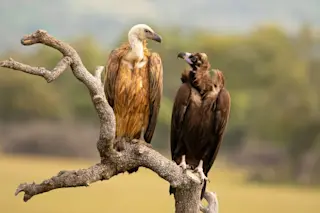Vultures often get a bad rap, but they play a vital role. You can think of this bird of prey as one of nature’s garbage collectors — devouring carcasses and other animal matter, mopping up potentially harmful pathogens in the process.
The problem is that populations of vultures and other apex scavengers are declining worldwide. In fact, approximately 36 percent of global scavenger populations are either threatened or in decline. According to researchers writing in the Proceedings of the National Academy of Sciences of the United States of America, this is not just a disaster for biodiversity – it could spell trouble for public health.
“There is this prejudice that these scavengers – vultures and hyenas and the like – are nasty animals and that we should get rid of them, but they are important not only for the functioning of ecosystems, but also for human well-being,” senior author Rodolfo ...















